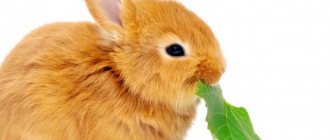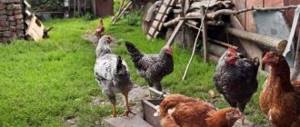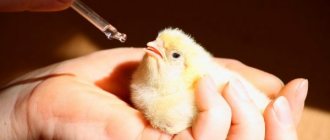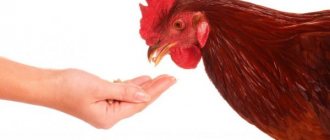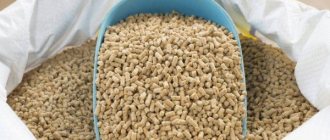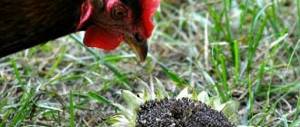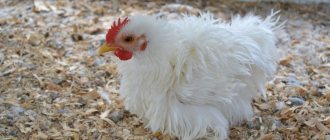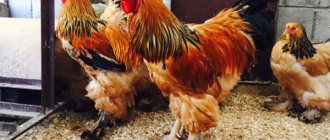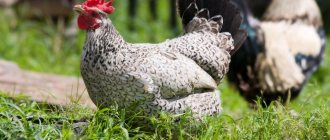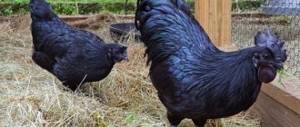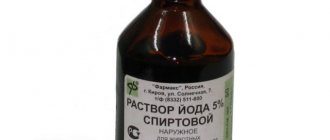What vitamins do chickens need to increase egg production?
Minerals and vitamins are biological catalysts for metabolism and other processes occurring in the body of any living creature. Their deficiency disrupts the functionality of internal systems, which leads not only to a decrease in egg production, but also to severe pathologies leading to the death of the animal.
Water-soluble vitamins:
- IN 1. A lack of thiamine leads to loss of appetite, decreased egg production and subsequent death. It normalizes the functionality of the endocrine and nervous system of the chicken. Without thiamine, the muscular system is affected, hatchability decreases and the fertilization process is disrupted.
- AT 2. Due to the lack of riboflavin, paralysis occurs, the bird does not grow, there are no eggs, because the vitamin accelerates all metabolic processes, restores tissue respiration and allows the body to more easily absorb important amino acids. And this affects fertility.
- AT 6. Adermin deficiency reduces egg production and hatchability of chickens. If there is enough of it in the diet, growth is stimulated and skin and eye diseases are prevented.
- AT 12. Growth is weakened and anemia occurs. Birds do not need much cyanocobalamin, but without it amino acids are not formed, and the protein obtained through plant feed does not become complete. This affects embryonic development, hatchability and egg production.
- Choline. Increases egg productivity. Without it, the liver becomes covered with fat and vitality decreases. Vitamin B4 should be administered to laying hens in small doses.
- Pantothenic acid. If there is a deficiency, tissues are affected and dermatitis occurs. It is especially important to add to the diet during the embryonic period, since without this substance hatching capacity is reduced.
- Biotin. In the absence of this, skin diseases of chickens occur and the hatchability of eggs is significantly reduced. Vitamin B7 must be administered artificially, since in feed it is found in a difficult-to-find formula. The exceptions are oats, green beans, grass and bone meal, fish meal.
- Folic acid. Deficiency is characterized by anemia, weakened growth, deterioration of plumage, and decreased egg production. Chicken B9 is partially obtained through microbial synthesis. When hens are fed clover, alfalfa or grass meal, protein levels increase. In this case, the body requires more folic acid.
Fat-soluble vitamins:
- With a lack of vitamin A , productivity decreases, there is no growth, and the body weakens. Vitamin A deficiency can be determined by examining the yolk of an egg - it becomes pale. The size of the eggs also decreases. The lack of vitamin especially affects the visual organs - the cornea becomes dry. In this case, laying hens are at risk of frequent illness.
- If group D , egg production decreases and rickets occurs. The vitamin affects the formation of bone tissue, as a result of which chicken bones become brittle and egg shells become loose. The main source is the sun's rays, so laying hens definitely need to walk outside.
- Vitamin E deficiency leads to softening of parts of the chicken's brain, decreased immunity, weakening of muscle tissue and disorders of the nervous system. With enough vitamin E, the chicken lays fertilized eggs.
- With a lack of vitamin K, the level of blood clotting worsens and internal bleeding occurs. Phylloquinone is synthesized by microorganisms and green vegetation. Deficiency rarely leads to disease, but reduces hatchability and egg production. Vitamin K deficiency often occurs due to feeding spoiled silage and hay.
Minerals:
- Calcium is an essential element, without which the shell and skeletal system become weak. It is easy to determine the deficiency - the laying hen lays eggs with a very thin shell, eating it.
- Magnesium - its absence is characterized by a sharp decrease in egg productivity and sudden death of the chicken, weakness of the skeletal system, and loss of appetite.
- Without phosphorus , eggshells do not form normally and rickets occurs. It helps to absorb calcium, without which the diet of laying hens is impossible.
- Lack of iodine leads to an enlarged goiter, which compresses the larynx, making breathing difficult. After the studies, it turned out that in chickens that were injected with iodine, egg production increased by one and a half times.
- Without iron , anemia develops and hens stop laying eggs.
- Lack of manganese - bones are anatomically deformed, eggs become thin-walled, and their number decreases.
- Zinc deficiency leads to deterioration of the skeletal system and disruption of the feathering process, causing the shell to become thin.
A lack of each microelement slowly destroys internal organs, but their excess can also lead to pathological processes. Therefore, it is important that the diet of vitamin foods is balanced. You need to know that in winter the amount of microelements should be increased.
Popular types of supplements
We recommend reading our other articles
- Soybean varieties
- Grape variety Victor
- The best varieties of pink tomatoes
- Apple tree variety Golden Delicious
There are a lot of varieties of premixes; at the time of purchase, the seller can offer many different companies. So it can be difficult to decide what to choose. The best feed additives for laying hens are presented below.
- “Ryabushka” is a budget but good premix. It contains no preservatives, hormones, stimulants, but only 12 vitamins, 7 amino acids. This additive for laying hens fully copes with its task; when added to the diet, the quality of the eggs and the condition of the birds improves.
- “Peromix” is a mineral supplement with an abundance of calcium, phosphorus, iron, zinc, selenium, and copper in its composition. When using it, birds get sick much less often, stop pecking at young animals and eggs, egg production, shell strength, and egg quality increase.
- “Zdravur laying hen” is a more expensive feed mixture, but of high quality. It contains 11 vitamins, 7 microelements, amino acids and even enzymes! The premix improves the functioning of the poultry’s gastrointestinal tract, eliminates the development of vitamin deficiency and cannibalism, improves the appearance of birds, and is used for egg production.
- “Salvavit” is a vitamin and mineral complex with an abundance of iron, zinc, copper, vitamins A, E, D, B, K, H. It also contains biotin, methionine, lysine, and folic acid. Suitable not only as an additive for laying hens, but also for broilers and turkeys. The premix improves the development of poultry, stabilizes metabolism, increases egg production, and activates the immune system.
"Miavit" - a complex of vitamins, minerals, filler
Important!
"Salvavit" is a high-quality additive that can only be used when birds are fed regular food. If birds are given compound feed, then it is unsafe to administer Salvavit - this can cause an overdose of nutrients.
- “Miavit” is a complex of vitamins, minerals (mainly iron and manganese), filler. This food improves metabolism, digestion, increases egg production, and reduces feed consumption.
These are just some of the laying hen supplements that are in high demand in the market. But there are other manufacturers. According to reviews, the additives “Kind Villager”, “Solnyshko”, “Agroservis”, “Rural Yard” are of good quality.
Complex vitamin preparations
Complex vitamin premixes are most often used in winter, when there is a shortage of greens and other products. They are aimed at strengthening the immune system, increasing the body's resistance to viruses and infections, and restoring productivity. Medicines should be given to chickens strictly in accordance with the instructions.
The most popular means:
- Vitvod is produced in the form of a solution, which is injected into laying hens or added to water. Contains vitamins A, D3, and E. For prevention, the solution is administered subcutaneously or intramuscularly once a month, for medicinal purposes - twice a month. For oral administration, the liquid is added to water or food once a day for 3 days.
- Vittry is available in the form of an oil solution. It contains vitamins D3, A, E. It is administered to the chicken intramuscularly or orally (through the beak). The liquid is added to the feed once a day for 2-3 months. For preventive purposes, 1-2 drops should be administered to 1 laying hen, and 3-6 drops for treatment.
- Vitamin and mineral supplement “Zdravur laying hen”. Consists of vitamins D, E, A, K, B2, B3, B5, B4, B6, B12, H, sodium and other minerals. The drug is rich in amino acids and important enzymes, which has a positive effect on the immune system and performance. Add 1 gram per head to chilled feed daily.
- Ryabushka. Contains a vitamin premix - H, A, B1, B2, B3, B4, B5, B6, B12, E, D3, K. Microelements - iodine, iron, manganese, copper, cobalt, zinc, selenium, amino acids. Daily dosage for one laying hen: for prevention - 0.5 grams, for therapy - 1 gram. The mixture is mixed with an equal amount of flour or bran, and then added to the general feed.
- The Agroservice mineral complex consists of proteins, vitamins and minerals - copper, zinc, iodine, cobalt, manganese, iron, selenium, phosphorus, calcium, etc. The daily dosage for 1 unit is 10 grams.
- Broiler economy (from the manufacturer KapitalProk) . Contains vitamins, copper, iron, manganese, cobalt, zinc, selenium, iodine. The recommended daily dose for 1 laying hen is 1 gram.
- Sun. The drug is based on vitamins and minerals (cobalt, iodine, zinc, iron, copper, manganese, selenium). It can be given to chickens from birth, which will ensure good egg production in the future. For 1 hen you need from 0.1 to 1 gram, depending on the degree of deterioration in egg laying. Before adding to the feed, the contents of the package are combined in equal proportions with flour or bran. The food must be chilled.
Types of feed additives for chickens
Also check out these articles
- How to plant carrots with seeds
- How to light a smoker for bees
- Canned fish in an autoclave
- Barley varieties
Feed additives may differ not only in purpose (for young animals, chickens, laying hens, broilers), but also in composition. Below are various types of premixes.
- Vitamin supplements for laying hens are purchased when birds lack vitamins. As a rule, the main problem is a lack of vitamin D. It is necessary for the health of poultry bones and shell formation. Birds can also pick up vitamin A, which affects vision, yolk, vitamin E is responsible for fertilizing the egg. Vitamin supplements are labeled this way; they are not difficult to distinguish; the amounts and types of vitamins are indicated on the label. Also, vitamin premixes may contain amino acids, which are necessary for their normal absorption.
- Mineral supplements for laying hens, the diet is enriched with minerals. In this case, you can buy individual products or mixtures. Chalk contains sulfur, iron, magnesium, and calcium. Salt includes sodium, potassium. The shell contains a lot of calcium. But these are simple mineral supplements that are always given to chickens. There are also special purchased mineral premixes, which contain many different minerals.
“Peromix” is a mineral supplement with an abundance of calcium, phosphorus, iron, zinc, selenium, copper in the composition
Important!
Most often, laying hens lack iron and vitamin D. So, when buying a premix for them, you should make sure that these elements will be in it at least in small quantities.
- Protein supplements for laying hens are protein concentrate. They supply the birds’ bodies with amino acids necessary for life. As you know, there is protein in grains and not much in boiled vegetables. If chickens are not regularly given various worms, bugs, and wheat germ, then such a premix may be required. Protein premixes are called that, but a lot of protein is also contained in feed additives such as bone, meat and bone meal or fish meal.
- Medicinal premixes include not only nutrients, but also medications. They are most often given to prevent various diseases for chickens and young animals. Adult laying hens are given medicinal supplements if they are already sick.
Important!
Medicinal premixes often include antibiotics, which can spoil the taste of eggs and poultry meat. In addition, after feeding them, you should not eat the eggs that the bird gives you for the next 4-7 days. Therefore, they are given to adult birds only in case of illness!
“Zdravur laying hen” is a more expensive feed mixture, but of high quality, it contains 11 vitamins, 7 microelements, amino acids and even enzymes!
- Complex premixes are among the most popular. They are given when there are no serious problems, simply for prevention, so that the laying hens have enough nutrients in the feed. Complex premixes may contain about 7-11 vitamins, minerals of various types, amino acids, and feed fats. Enzymes are also sometimes added to them to improve digestion.
Feed additives for egg production and poultry health can be purchased at any veterinary or agricultural store or on the Internet. They are sold in different packages for small and large farms. But you shouldn’t buy a large pack right away. Experts recommend first testing a small portion of the premix on birds, and then purchasing a large batch of the additive, since sometimes birds react poorly to certain components in the composition.
Minerals
Minerals are used to improve egg production, especially in winter and when chickens are in locked rooms. They contain a shock value of calcium and other elements.
Today they are sold in specialized stores, but it is better to make them yourself. You can use the following:
- Give chalk in large pieces, and the chickens will peck it on their own. But you can add chalk powder to the food.
- Use homemade or store-bought eggshells, but before giving them to the birds, be sure to crush them and bake them in the oven for 15-20 minutes at high temperature. This will avoid infection.
- You can crush seashells.
- Sand, which is rich in minerals, is also used.
- Suppress the lime and let it sit for two weeks. Then add river sand and pour it into the feeder.
- It is allowed to give crushed stones, gravel, and wood ash.
What not to feed laying hens
It is worth carefully monitoring what birds eat, since due to their omnivorous nature, chickens can peck spoiled food. Rotten or fermented foods, moldy bread, raw potatoes, and whole root vegetables should not be included in grain mixtures.
Be sure to read:
Is it possible to give dandelions to chickens?
Care must be taken to ensure that the chickens do not get any inedible items, such as pieces of packaging, plastic or foil. It is also worth making sure that the food does not contain poisonous plants.
What fortified food is given to laying hens for egg production?
There are many fortified food products for hazel grouse that are not only allowed for consumption, but also recommended. But each food has its own characteristics.
Cereals
The main food product of poultry is grain crops, and different ones, so you need to follow the rules of diversity. If you mix several types and give such food at the same time, then nothing good will come of it.
The healthiest grains:
- Wheat must be included in the menu and make up 75-80% of the total grain mass, since it contains proteins and vitamins E and B.
- Barley is considered highly nutritious because it is carbohydrate-based. They are given dry in all seasons, except in winter - you will have to germinate them.
- Oats contain fiber and fat, which prevents feathers from being plucked from each other. It should be given in steamed and sprouted form.
- Rye is rich in proteins, but other beneficial substances are contained in small quantities, so it is not recommended to constantly feed birds with this grain.
- Chickens love corn, and this is justified, since the cereal contains many substances necessary for egg production. The grains are pre-crushed, since their size clogs the esophagus. Corn can lead to obesity, so it is given in small doses.
Root vegetables and vegetables
What and how to give:
- Sugar beet or fodder beet in raw form. Grate the root crop and add it to the general feed mixture. Compound:
- vitamins – C, retinol, thiamine, riboflavin, tocopherol, pyridoxine, nicotinic, pantothenic, folic acid;
- other – organic acids, flavonoids, pectin, betacyanins.
minerals – iodine, manganese, zinc, iron, phosphorus, magnesium, copper, potassium;
Legume grain
From legumes, it is recommended to give beans, soybeans, black and white varieties, and lentils. But it is not advisable for chickens to eat this food raw, as it contains toxins. If you boil it thoroughly (until completely cooked), then harmful substances will end up in the water. Beans contain vitamins PP, C, B, many minerals, amino acids, proteins and fiber.
The beans are initially soaked for 40 minutes in water and then boiled. It can be given as a separate dish or added to other food.
Mealy feed
Some chickens cannot tolerate certain foods, so they produce mealy feed, that is, flour. For this you can use oats, barley, wheat, soybeans, amaranth, and corn.
Take the grains, grind them to a powder and add them to any food.
Read more about the diet of laying hens here.
Protein food and worms
Protein foods contain a large number of amino acids, which fill the body with energy and are its building material. Such food includes products of plant and animal origin:
- peas and beans;
- sunflower seeds;
- rapeseed;
- linen;
- sesame;
- cottage cheese;
- meat and fish by-products (chopped);
- fish and meat flour;
- bone flour;
- serum.
It is not advisable to feed laying hens fish because the eggs will acquire a fishy smell. These by-products can be added in small portions 1-2 times a week.
Earthworms are a protein food. They contain up to 28% protein, fats, etc., which is necessary to increase the productivity of eggs.
Chickens easily peck the worms, so you can simply pour them into the chicken coop. And to breed them, it is enough to use any organic material. This can be peelings of potatoes, carrots, beets and other vegetables, root vegetables, horse manure, pulled weeds, fallen leaves, paper. Moreover, you do not need to allocate a lot of space for reproduction, since this process occurs in a short time.
Nutritional supplements
Food additives include different types of flour, which were discussed above, but you can add the following:
- pine flour - obtained from dry branches by grinding;
- probiotics – strengthen the immune system, restore gastric microflora;
- seaweed (dry) – strengthens eggshells;
- fish oil – increases productivity;
- unfiltered apple cider vinegar – strengthens the entire body (added to water).
How to properly prepare a grain mixture for laying hens with the addition of food additives is described in the following video:
Greenery
Not a single laying hen can do without greens. It should be present in the diet of all chickens. You can give alfalfa, fresh vegetable tops, grain crops, dandelion and any grass.
Before serving, finely chop the greens with a knife. If possible, it is permissible to let chickens roam on their own.
Other products
List of foods that can be given to increase egg production:
- Pure water. Without it, the hen becomes dehydrated, which negatively affects productivity.
- Bread crumbs. Fresh bread, especially yeast bread, should not be given, as fermentation occurs in the stomach. Crackers can be given dry, after crumbling or briefly soaking in water. But keep in mind that the bread must be dried thoroughly and not contain moldy areas.
- Pumpkin, squash, radish, zucchini. The melons are cut and placed in the chicken coop.
To increase egg production, give laying hens the following feed: KK-1, PK-1, Premix.
What food should not be given to laying hens?
There are foods that are strictly prohibited for laying birds:
- Large amount of salt. It turns out that it is enough for chickens to consume ordinary water, which contains a maximum of 0.25% salt. If you add additional salt to your food, it will lead to intoxication.
- Nightshade vegetables - tomatoes, potatoes, eggplants. If you give fruits unripe or throw away the leafy part, the bird will receive a significant amount of the toxin - solanine.
- Citrus fruits cause allergic reactions, but not in all types of chickens.
- Onions contain thiosulfate, which is a toxic substance. Leads to anemia and death.
- Dried beans. It is also undesirable to give these crops undercooked. But if you boil them well, the toxins are destroyed.
- Dry rice clogs the intestines.
- Apple seeds contain a high level of cyanide for chickens, which leads to death. Therefore, if you introduce apples, which are rich in iron, into your diet, be sure to get rid of the seed part.
- Human food products – sausages, salted fish, smoked meats and the like.
Raw eggs are very rich in nutrients, but they are not allowed to be given to laying hens. The reason is banal - cannibalism arises.
When selecting vitamins to increase egg production, it is necessary to take into account the age of the laying hen, characteristics of the breed (some of them cannot tolerate certain foods), veterinarian testimony (possible diseases), and climatic conditions. Based on this, you can create a balanced diet, and if necessary, seek advice from a specialist.
0
0
Copy link
